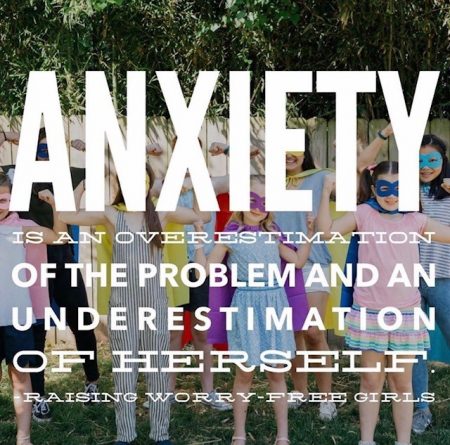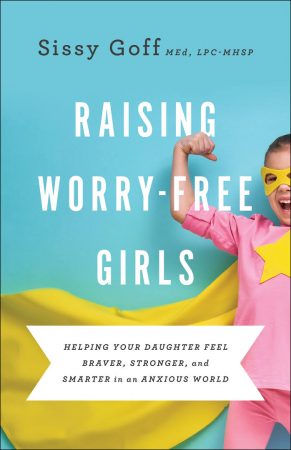Raising Worry-Free Girls

Friends, I’m thrilled to share a guest post from Sissy Goff, author of Raising Worry-Free Girls, which releases this week! Sissy has counseled teen girls for almost 30 years and is one of my most trusted sources of parenting advice. Sissy read 23 books on anxiety as research for Raising Worry-Free Girls, so it is packed with wisdom and hope. Grab your copy and share this message with friends. Thank you, Sissy, for being a gift to today’s moms!

__________________________________________________________________________________________________
When Kari invited me to write for her blog, she asked about the most common questions that parents ask about girls and worry.
Here’s the thing: They’re often don’t ask. They don’t always recognize worry as the source of their concerns.
-
- Why does my daughter keep having meltdowns?
- Why does she have tummy aches the doctor can’t find a medical cause for?
- Why does she study for much longer than she needs to?
- Why is she so hard on herself?
- Why does the teacher tell me how wonderful she is…when I get the opposite as soon as she gets in the car after school?
- Why does she keep asking the same questions about what’s next on the schedule?
The questions are all different, yet the answer is the same: The Worry Monster.
That is what we call him at Daystar Counseling, where I’ve had the privilege of working with girls and their families for 27 years. You’ve likely heard that anxiety is a childhood epidemic in America today. And, let me tell you, it is sure what I see on a daily basis behind the closed doors of my counseling office.
When our team’s last book, Are My Kids on Track?, launched only four years ago, the statistics were that 1 in 8 kids struggle with anxiety. Today, the statistics are 1 in 4. Girls are twice as likely to face it as boys, so we talk about the Worry Monster a LOT in my office.
Here’s another thing I tell girls and parents: Girls who worry are some of the kindest, most conscientious, try-hard, smartest girls I know…which is why they worry. They care. Things matter to them. People matter to them. But, The Worry Monster takes a gift God has placed inside of them and turns it. He hijacks their brain and makes their care manifest as preoccupation. I compare it to the one loop roller coaster at the fair.
-
- What are we doing next?
- When are you going to dinner?
- When will you be back?
- Who is taking care of me?
You get the idea.
Their care takes over and the worry literally consumes their brain. Your well-intentioned, kind, and smart girl who does great at school all day gets home and melts down. Or, she melts down over what clothes she should wear for school the next day. The emotion that parents most often describe in their girls isn’t actually worry — it’s anger. Yet, the more we talk, the more certain themes come to light.
-
- She gets angry the most in times of transition, when she’s turning on a dime to go from one thing to the next.
- She melts down the most when there’s a time frame, like getting dressed in the mornings.
- She gets frustrated and teary when things don’t go as she thought they would.
It’s change. It’s unpredictability. It’s pressure that sets the Worry Monster off and causes him to take over the brains and emotions of these girls we know and love.
There is some discrepancy about the average age of onset of anxiety. Some research says six years old, and some says eight. Symptoms can emerge as young as four or five, and I definitely see an uptick around the age of puberty. As you can imagine, at four or five or six or eight years old, and sometimes even in puberty, girls don’t yet have the verbal acuity or emotional maturity to say, “Mom, I feel worried.”
Consequently, their worry comes out as anger.
For years psychologists have considered anger a secondary emotion, meaning there is another lying emotion beneath the anger. My experience is that, for most girls today, worry is at the root of their anger, especially in times of pressure or unpredictability.
One question I ask parents is: “Do you have any family history for anxiety?” In many cases, the mom will laugh and reply, “My mom was sure anxious, but never used that word.” Or the dad will simply smile and point to his wife. If you have a family history for anxiety, your child is seven times more likely to face it herself.
The good news is, there is hope.
The same conscientiousness, intelligence, and thoughtfulness that makes a girl prone to worry also makes her more able to fight the Worry Monster with the same intentionality and smarts. With guidance, she can quiet his voice in her head and replace it with healthier thoughts.

There is a reason we call him the Worry Monster, and that’s because we want her to separate his voice from her voice. We want girls to recognize that worry isn’t truth — it’s just worry. We want your daughter to be able to say to you, “Mom, the Worry Monster has really been bothering me about this upcoming test,” or you to be able to say to her, “Is that worry talking or is it you?”
Again, there is hope. Your daughter can fight this. Research says that most children who worry go two years before receiving the help they need. All of these reasons — and questions — are why I’ve written two books on worry.
One book is for parents and called Raising Worry-Free Girls. The other book is for elementary-aged girls and is called Braver, Stronger, Smarter — because that’s precisely what they are. My hope is that both these books will work me out of a job!
The start point is to recognize worry for what it is in the lives of the girls we love. We want to help the girls recognize it as well — and call the Worry Monster by name. When we name him, we significantly reduce his power. We give girls tools to help them when the worries come. No matter where your daughter is on the worry spectrum, remind her that there is hope. She’s not alone. She’s got you. And together, you two can make a really strong Worry Monster fighting team!
___________________________________________________________________
Sissy Goff, MEd, LPC-MHSP, is the director of child and adolescent counseling at Daystar Counseling Ministries in Nashville, Tennessee. Since 1993, she has been helping girls and their parents find confidence in who they are and hope in who God is making them to be, both as individuals and as families. Sissy is the author of several books and a sought-after speaker for parenting events. You can find her books everywhere books are sold and purchase her latest book, Raising Worry-Free Girls, here.

Posted by Kari on September 15, 2019








0 Comments